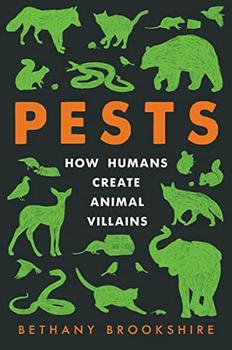Summary | Excerpt | Reviews | Beyond the Book | Readalikes | Genres & Themes | Author Bio

How Humans Create Animal Villains
by Bethany Brookshire
Why do some animals succeed so spectacularly at living with us, while others fail? And what do our pests tell us about our impact on the world?
I dug into history, research, religion, and rat nests. I spoke with scientists, historians, wildlife managers, pest control operators, and philosophers. I also spoke with Indigenous people—people who grew up with traditions very different from my own. Where I could, I spoke with members of Indigenous groups directly. Sometimes, though, I could not. Western views like mine—including the previous work of Western science—have done harm to Indigenous people and their land, sometimes pushing them off it entirely and often stripping them of the ability to protect their ecosystems and to preserve the knowledge they gained over so many generations. Journalists, also, are not always welcome, as previous coverage has not been fair or even polite.
When Indigenous people were generous and spoke with me, I listened and learned, but I know that no one person, or ten, can speak for everyone. Every group contains multitudes and many different ways of looking at the world. But we are all of us influenced by the culture we live in, and when we find ourselves in opposition to another creature, it's often our culture that determines whether we see a nonhuman neighbor—or a pest.
In addition to learning and listening, I went to the pests themselves. I hunted pythons in the dead of night, ate pigeon, and went on a rat safari. I tamed feral cats, tracked down drugged-up black bears, and reached into a coyote's rotting stomach. I smelled elephant repellant and shared a pigeon's lice. I did it because I wanted to know just why we hate some animals so terribly much—and why we love others, despite the harm they may cause.
What is the source of our disgust, our fear, and our disdain? What makes some animals so much better at living alongside us than others? How do our beliefs make us overlook animal harms? Why do some animals make us feel so powerless? And why, when we rip down their habitats, do some animals manage to persist?
I've chosen vertebrates—birds, reptiles, mammals like F**ing Kevin—as the subjects of this pest tour. To many Westernized people, bugs aren't as complicated as rats, cats, or deer. Insects don't cause many of us feelings of internal conflict. Most people will smoosh the bugs they hate (roaches, centipedes, take your pick) with a shoe and a small sense of triumph.
Vertebrate pests are another matter. We can see them in more than one way. We can put poison out for rats and protest their use as laboratory animals. We can shoot deer in the fall and show their adorable offspring to our children in the spring. Vertebrate pests lay bare our internal hypocrisy—how the natural world fills people who live separate from it with both adoration and dismay. Maybe that's a good thing. Maybe we need an animal reminder now and then to keep us humble.
I hope that, like me, you'll end up with respect instead of disdain. Awed by sheer adaptability and persistence, I hope you'll even cheer for a rat or two. Pests are proof not that nature is out to get us, but that it's all around us. Nature lives in our walls, poops on our heads, and eats all our tomatoes. Pests are what happens when we think we've got nature all figured out, and nature decides to give us the finger. Their story is one of human irritation—but also of animal triumph.
Excerpted from Pests by Bethany Brookshire. Copyright © 2022 by Bethany Brookshire. Excerpted by permission of Ecco. All rights reserved. No part of this excerpt may be reproduced or reprinted without permission in writing from the publisher.
Your guide toexceptional books
BookBrowse seeks out and recommends the best in contemporary fiction and nonfiction—books that not only engage and entertain but also deepen our understanding of ourselves and the world around us.